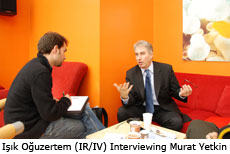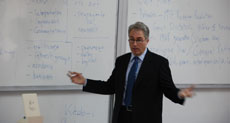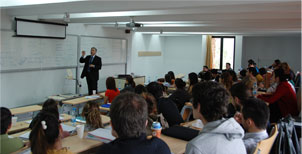 The International Relations and Media class is being instructed by Radikal daily newspaper's Ankara bureau representative, Murat Yetkin. This is a new elective course being offered this semester by the Department of International Relations. The class fuses these two distinct concepts in an academic setting for the first time in Turkey: a move many say is already too late. The International Relations and Media class is being instructed by Radikal daily newspaper's Ankara bureau representative, Murat Yetkin. This is a new elective course being offered this semester by the Department of International Relations. The class fuses these two distinct concepts in an academic setting for the first time in Turkey: a move many say is already too late.
Unlike most courses, which seek to prepare students for the real world by "operationalizing" standard theory, Mr. Yetkin's course offers an academic conceptualization of an existing real-world practice.
"Much of the work we do as journalists is conducted without too much forethought; field experience means a lot of our work is quite automatic," says Yetkin. "But when teaching a course on the topic, you need to take a step back and look at the big picture." Seeing that big picture seems to be Mr. Yetkin's specialty. Last year he delivered a course on news writing and reporting through the Department of Communication and Design. But instead of just lecturing on the "Five Ws" of reporting, he instead chose to mobilize the students. Within a few weeks, his class had built a website where they maintained a weekly online news bulletin, Bayat Haber (Stale News). "Students feel engaged when they see the results of their education
and their work," mused Yetkin. "Five Ws" of reporting, he instead chose to mobilize the students. Within a few weeks, his class had built a website where they maintained a weekly online news bulletin, Bayat Haber (Stale News). "Students feel engaged when they see the results of their education
and their work," mused Yetkin.
His latest venture is again rather experimental in nature. Each week, the course will bring together guest speakers from a variety of vocations pertinent to international relations, and students, who will have the opportunity to ask pressing questions. Heated discussions on Turkey's lobbying activities in the United States and the United Nations, the role of mobile technology for today's journalists, and special question and answer techniques can prepare students for their future careers - regardless of what their individual aspirations may be.
"What I love about this course is that it offers something for everyone: learning specific skills, like how to formulate the right question at the right time. That's crucial in every walk of life," says Selim Barkan (IR/IV). Her friends agreed. "Having a sound understanding of the role of the media in international relations is as necessary as it  is a social reality. We need to understand and seriously consider the effects of the media on public opinion and policy-making, [and] vice-versa" argues Emirhan Demirel (IR/IV). In essence, it seems a better understanding of how the media functions can provide a better understanding of decision-making processes as a whole. is a social reality. We need to understand and seriously consider the effects of the media on public opinion and policy-making, [and] vice-versa" argues Emirhan Demirel (IR/IV). In essence, it seems a better understanding of how the media functions can provide a better understanding of decision-making processes as a whole.
Courses like "International Relations and Media" can help teach students to think outside the box, practice otherwise abstract theories, and actively see International Relations as something more than just an academic endeavor. Many of Yetkin's students seem to feel this vibrant, up-and-coming field should play a much greater role as a fundamental pillar of education, rather than an optional sidetrack. Budding journalists and social anthropologists are not the only ones who have something to gain from such media studies. Those in Yetkin's class seem to agree: we all do.
By Işık Oğuzertem (IR/IV)
 |







